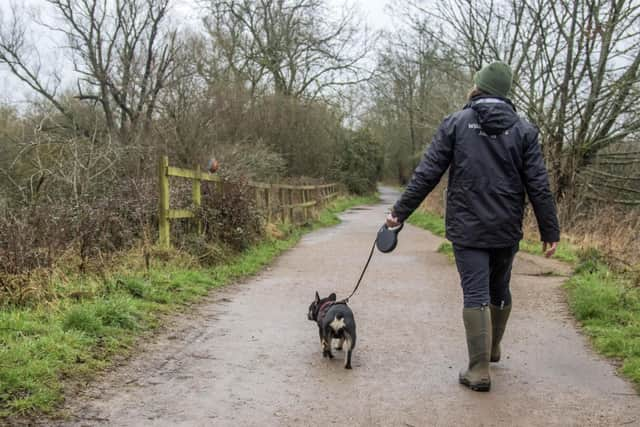Wildlife Trust urges Northamptonshire dog owners to keep pets on leads to protect wildlife at county sites
and live on Freeview channel 276
The Wildlife Trust for Beds Cambs and Northants is encouraging dog owners to understand the importance of keeping their pets on leads during visits to nature reserves and the wider countryside.
Across Beds, Cambs and Northants, problems caused by dogs have increased in the past few years.
Advertisement
Hide AdAdvertisement
Hide AdIn Northamptonshire’s Nene Valley Special Protection Area (SPA), a recent bird disturbance survey concluded that keeping dogs on leads lowers the severity of disturbances to birds across the sites.


The study recorded 4,937 visits to key locations in the SPA and found that dogs off leads were four times more likely to cause disturbance than dogs on leads.
In total, visits by dogs off leads led to a disturbance event in 19 per cent of instances and dogs on leads in 4.5 per cent of instances.
The study recorded 619 disturbance events and found that dogs off leads were the most common cause of bird disturbance, leading to 42 per cent of
Advertisement
Hide AdAdvertisement
Hide Adall disturbance events, compared to dogs on leads which led to three per cent of all disturbances.
Natural England rate disturbance from recreation (particularly walkers and dog owners) as the top threat to the SPA bird populations.
For example, golden plover numbers within the SPA have declined significantly (76 per cent in recent years).
Disturbance from recreation affects wintering birds by reducing the time available for feeding, and increasing energy expenditure when avoiding those sources of disturbance.
Advertisement
Hide AdAdvertisement
Hide AdMatt Johnson, Northants conservation manager, said: “We’re asking everyone who visits our reserves to keep their dog on a lead at all times.
"Recent survey work has highlighted the negative impacts of dogs off leads on our important birdlife, in particular disturbance of overwintering and breeding birds.
"Here in Northants we’ve been working with Nene Valley Woofs to promote responsible dog ownership in the Nene Valley to better protect wetland birds, meaning our wildlife can happily coexist with our furry friends.
"We are running joint events this year at the Nene Wetlands and Summer Leys.”
Advertisement
Hide AdAdvertisement
Hide AdDr Jenna Kiddie, head of canine behaviour at Dogs Trust, said: “Dogs enrich our lives, but they also bring a level of responsibility.
"Whilst many of us enjoy taking our dogs for long walks, especially as it becomes a bit warmer, we urge dog owners to consider their surroundings, particularly when visiting areas where they might encounter wildlife.
"When visiting rural areas, owners should keep their dogs under control and ensure they do not worry other animals or stray from the path, as well as dispose of their dog’s waste appropriately.
"We would advise keeping dogs on a short lead, and close to you, especially whenever livestock are nearby.”
Advertisement
Hide AdAdvertisement
Hide AdMany dog owners are passionate about nature and want to avoid harming it.
However, even the most well-behaved dogs can unintentionally cause distress or damage wildlife – birds perceive dogs as predators; when dogs roam freely, birds may abandon their nests, leaving eggs and chicks unprotected.
From designated walking paths to understanding wildlife seasons, plenty can be done to ensure everyone has a safe and enjoyable experience – on two legs or four.